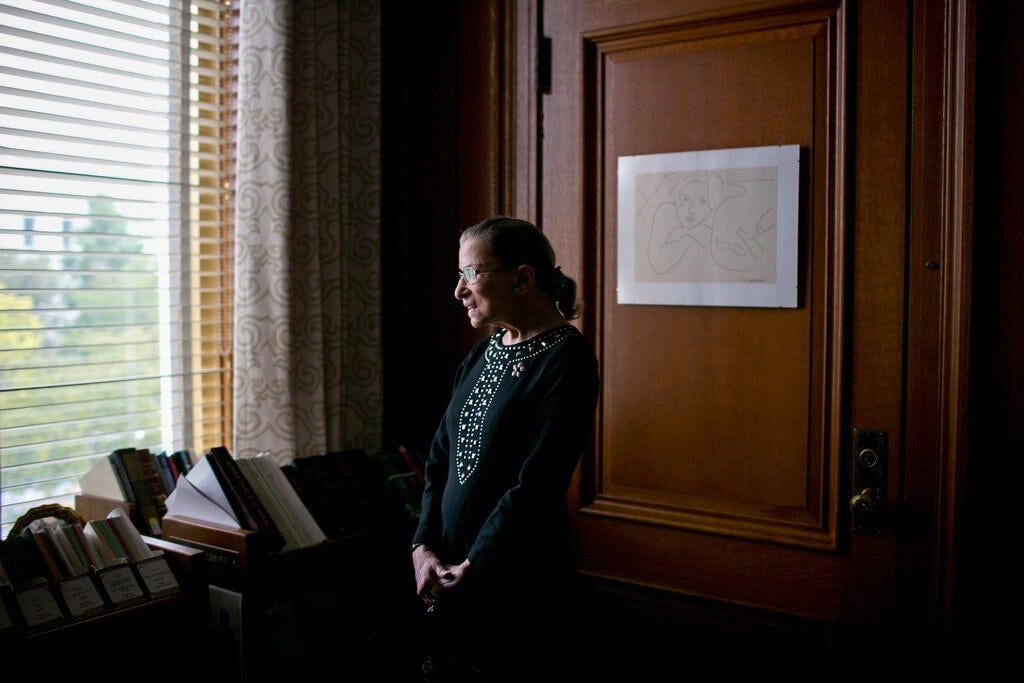RBG's Legacy and the Fight For the Ninth Seat
Looking at the legacy of Ruth Bader Ginsburg and the upcoming fight for the Ninth Seat in the Supreme Court

Photo Credit: Todd Heisler/The New York Times
On March 16th, 2016, President Obama nominated then- Chief Judge of the United States Court of Appeals for the District of Columbia Circuit, Merrick Garland to the Supreme Court. This was to fill the vacant seat of Antonin Scalia, who had passed away a month before. Senate majority leader Mitch McConnell refused to take up a vote stating that "the American people should have a say in the court's direction. It is a president's constitutional right to nominate a Supreme Court justice, and it is the Senate's constitutional right to act as a check on the president and withhold its consent." The Supreme Court seat sat vacant for almost a year - with the court itself having to rule within a 4-4 margin until it was filled by Justice Neil Gorsuch as per nomination from President Trump.
Both Senators Ted Cruz and Lindsey Graham have echoed this sentiment on not voting on a new Supreme Court judge in an election year. However, shortly after the passing of Ruth Bader Ginsburg, Mitch McConnell put out a statement saying that whoever President Trump’s nominee may be will receive a vote on the Senate floor. So what changed? Fair is fair, right? Last time I checked, we’re in an election year - less than two months from selection for our president. So, as things like the reauthorization of the Voting Rights Act, Pandemic aid, and a government spending bill hangs in the balance, our Senate Majority leader contradicts himself and rush this through. With the death of Justice Ruth Bader Ginsburg, let’s look at what’s in play with this ninth seat and how our Supreme Court process may be looked at in its entirety.
Think about this - Justice Clarence Thomas is amidst a 28-year tenure within the Supreme Court. Are these long acts of service conductive to a country that constantly changes? Thomas is the only male judge of color. With the untimely death of Ginsburg, there are only two acting women on the Supreme Court, and a potential pick, Senator Tom Cotton, has already declared his intentions to end the provisions of Roe v. Wade if selected. Is this right for a majority male court to decide the autonomy of women bodies that will have ramifications for generations? The Supreme Court as established in Article III of the Constitution in 1789 was created as the highest law in the land - however, the institution itself found its inception by white men. No women or people of color were considered in that makeup. Perhaps we have to look at things such as term limits to gain an electorate that resembles the picture of the country and not a painted portrait of yesterday.
We have things called amendments for a reason. If you brought someone from 1776 to our current time and they see things like the internet and cars - they wouldn’t be able to quantify the thoughts of how these things were made. Better yet, they would probably short circuit when they say the diverse makeup of our demographic. Documents like the Constitution and The Bill of Rights were made to provide a framework of a nation. They are your skeleton outline - if recent times have taught us anything, there are loopholes to this that we couldn’t even see being exploited. I’d have to ask - why are we so beheld to an outdated model that is not indicative of where we are now? The monuments that depict those times that the country was built upon have to get renovated from time to time - we can do that with our founding documents.
With that, I have to look back at the legacy of Ruth Bader Ginsburg - a woman that met societal roadblocks and didn’t blink. Early in her law career, Ginsburg was rejected by then-Supreme Court Justice Felix Frankfurter for a clerkship position due because she was a woman. When she became a law professor at Rutgers University, she was one of only 20 female law professors in the entire United States. She co-founded the Women's Rights Project at the American Civil Liberties Union, where she fought for equal gender rights. Soon, she served on the U.S. Court of Appeals, nominated as a Supreme Court Judge by President Clinton and confirmed in 1993. She was only the 2nd female judge to serve on the court other than Sandra Day O’ Connor.
Ginsburg was a champion of women’s reproductive rights as noted in her dissents in the Stenberg v. Carhart and Gonzalez v. Carhart cases. Took up the issue of equal pay for women in Ledbetter v. Goodyear Tire and Rubber Company. She also authored the court's opinion in the United States v. Virginia case which ended that military institute’s same-sex policy. With her passing, many female citizens around the country are frightened that they will face decisions that will grant them less access to vital healthcare and choices over their own reproductive organs. If you want to properly honor Ginsburg, then uphold the many standards that she so fiercely fought for when she was alive.
It’s a little over forty days before the general election and headed to a potentially turbulent lame-duck period in the presidency. Ruth Bader Ginsburg’s legacy will be signed with the pen strokes of her spirit, fighting to stay on the court until the last second. Her last wish was for her seat not to be replaced until a new president is sworn in - echoing the same sentiments that he said in 2016. For her forty-plus years of service within the law profession and twenty-seven years serving as a justice on the Supreme Court - I think we owe her at least that. This woman fought five bouts of cancer and expressed a desire to stay on for five more years. Some may criticize her for not retiring, however, I’ll meet you with these points: why was there a call for just her to retire? Some of her male counterparts have served as long as she has and is holding steadfast to their outdated way of thinking. Also, think of our dire our country’s psyche is where we are hinging our bets for someone to stay on the Supreme Court because we are afraid of what could come next?
I’ll leave you with Ginsberg’s own words from an interview in 2019.




